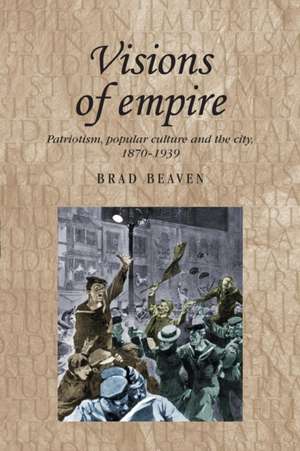Visions of Empire: Studies in Imperialism
Autor Brad Beavenen Limba Engleză Paperback – 3 ian 2017
| Toate formatele și edițiile | Preț | Express |
|---|---|---|
| Paperback (1) | 343.91 lei 6-8 săpt. | |
| MANCHESTER UNIVERSITY PRESS – 3 ian 2017 | 343.91 lei 6-8 săpt. | |
| Hardback (1) | 722.79 lei 6-8 săpt. | |
| MANCHESTER UNIVERSITY PRESS – noi 2012 | 722.79 lei 6-8 săpt. |
Din seria Studies in Imperialism
- 23%
 Preț: 727.23 lei
Preț: 727.23 lei -
 Preț: 246.07 lei
Preț: 246.07 lei -
 Preț: 155.84 lei
Preț: 155.84 lei -
 Preț: 156.16 lei
Preț: 156.16 lei -
 Preț: 207.27 lei
Preț: 207.27 lei - 23%
 Preț: 569.48 lei
Preț: 569.48 lei -
 Preț: 155.46 lei
Preț: 155.46 lei -
 Preț: 155.23 lei
Preț: 155.23 lei -
 Preț: 135.06 lei
Preț: 135.06 lei -
 Preț: 245.95 lei
Preț: 245.95 lei - 23%
 Preț: 537.29 lei
Preț: 537.29 lei - 14%
 Preț: 522.41 lei
Preț: 522.41 lei - 23%
 Preț: 537.69 lei
Preț: 537.69 lei -
 Preț: 155.39 lei
Preț: 155.39 lei -
 Preț: 207.93 lei
Preț: 207.93 lei - 23%
 Preț: 537.76 lei
Preț: 537.76 lei -
 Preț: 208.18 lei
Preț: 208.18 lei -
 Preț: 155.31 lei
Preț: 155.31 lei - 23%
 Preț: 537.99 lei
Preț: 537.99 lei -
 Preț: 207.56 lei
Preț: 207.56 lei -
 Preț: 247.93 lei
Preț: 247.93 lei - 14%
 Preț: 522.50 lei
Preț: 522.50 lei -
 Preț: 448.99 lei
Preț: 448.99 lei -
 Preț: 136.61 lei
Preț: 136.61 lei -
 Preț: 226.87 lei
Preț: 226.87 lei -
 Preț: 246.89 lei
Preț: 246.89 lei -
 Preț: 208.41 lei
Preț: 208.41 lei -
 Preț: 156.46 lei
Preț: 156.46 lei -
 Preț: 207.26 lei
Preț: 207.26 lei - 23%
 Preț: 538.23 lei
Preț: 538.23 lei -
 Preț: 207.19 lei
Preț: 207.19 lei -
 Preț: 207.01 lei
Preț: 207.01 lei - 23%
 Preț: 537.99 lei
Preț: 537.99 lei -
 Preț: 207.19 lei
Preț: 207.19 lei - 23%
 Preț: 537.50 lei
Preț: 537.50 lei -
 Preț: 206.67 lei
Preț: 206.67 lei - 23%
 Preț: 537.84 lei
Preț: 537.84 lei - 23%
 Preț: 573.25 lei
Preț: 573.25 lei -
 Preț: 295.45 lei
Preț: 295.45 lei -
 Preț: 206.35 lei
Preț: 206.35 lei -
 Preț: 155.75 lei
Preț: 155.75 lei -
 Preț: 246.40 lei
Preț: 246.40 lei -
 Preț: 247.76 lei
Preț: 247.76 lei -
 Preț: 155.64 lei
Preț: 155.64 lei - 23%
 Preț: 723.67 lei
Preț: 723.67 lei -
 Preț: 222.63 lei
Preț: 222.63 lei -
 Preț: 225.74 lei
Preț: 225.74 lei -
 Preț: 284.31 lei
Preț: 284.31 lei
Preț: 343.91 lei
Nou
Puncte Express: 516
Preț estimativ în valută:
65.83€ • 71.53$ • 55.33£
65.83€ • 71.53$ • 55.33£
Carte tipărită la comandă
Livrare economică 21 aprilie-05 mai
Preluare comenzi: 021 569.72.76
Specificații
ISBN-13: 9781526106698
ISBN-10: 1526106698
Pagini: 240
Dimensiuni: 156 x 234 x 14 mm
Greutate: 0.39 kg
Editura: MANCHESTER UNIVERSITY PRESS
Seria Studies in Imperialism
ISBN-10: 1526106698
Pagini: 240
Dimensiuni: 156 x 234 x 14 mm
Greutate: 0.39 kg
Editura: MANCHESTER UNIVERSITY PRESS
Seria Studies in Imperialism
Descriere
Descriere de la o altă ediție sau format:
This book offers a ground-breaking perspective on how imperial culture was disseminated from the 1890s onward. It identifies the important synergies that grew between a new civic culture and the wider imperial project. Three case studies are considered against an extensive analysis of seminal and current historiography.
This book offers a ground-breaking perspective on how imperial culture was disseminated from the 1890s onward. It identifies the important synergies that grew between a new civic culture and the wider imperial project. Three case studies are considered against an extensive analysis of seminal and current historiography.
